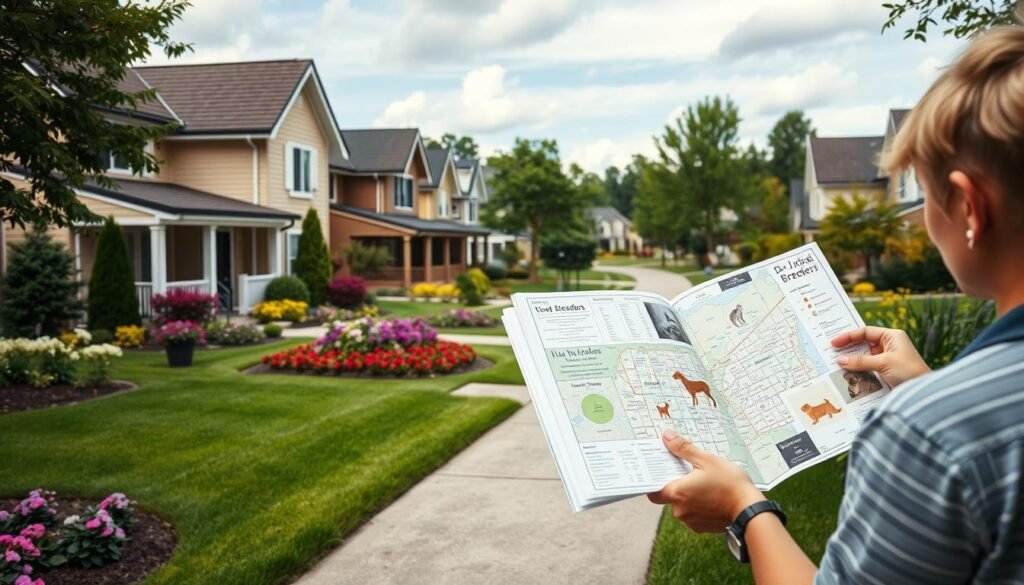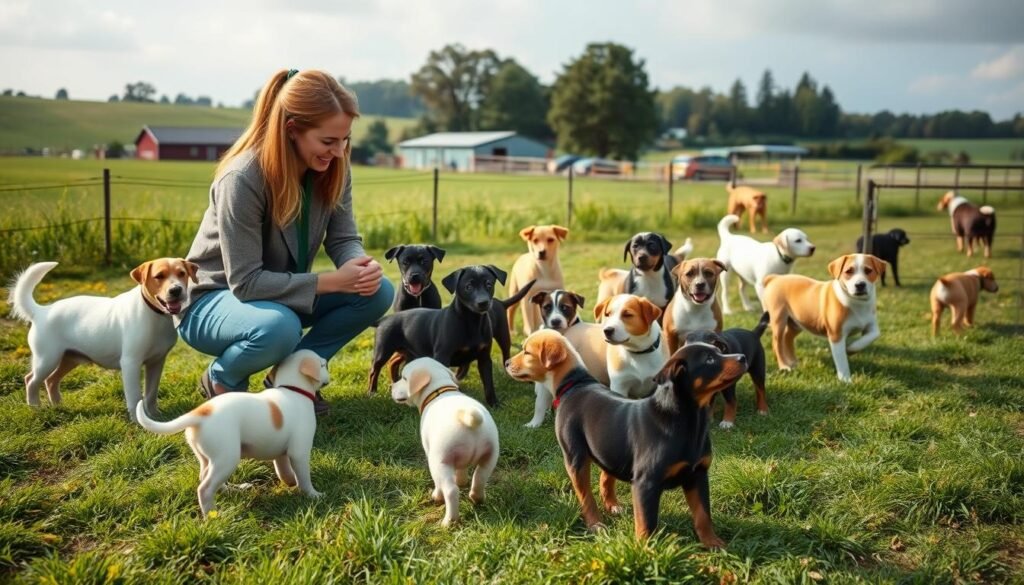Looking for a good breeder means caring about your future puppy’s health and happiness. A good breeder always puts their animals first. They make sure every puppy grows up loved and healthy. This guide helps you find such breeders. We’ll show you what to look for, from important qualities to health checks. Let’s get started on the journey to find your new furry friend.
Key Takeaways
- Understanding the definition and importance of a reputable breeder can enhance your puppy’s health.
- A reputable breeder engages in responsible breeding practices to prevent health issues.
- Key traits of good breeders include experience, transparency, and ethical practices.
- Health screenings are essential in ensuring the well-being of both puppies and their parents.
- Researching breed standards helps you ensure compatibility and promote healthy traits in your puppy.
- Effective puppy socialization techniques contribute to your new pet’s long-term behavior.
Understanding the Importance of a Reputable Breeder
Finding a new furry friend means choosing a reputable breeder is key. They impact your pet’s health and happiness. Knowing what makes a breeder reputable is vital for ethical pet care.
What Defines a Reputable Breeder?
Reputable breeders follow strict rules and ethical standards. They ensure:
- Adhering to breed standards: They know and meet breed needs.
- Health screening: They check animals’ health to reduce genetic problems.
- Limit breeding: They breed responsibly, focusing on animal welfare.
- Socialization: They introduce puppies to humans and animals early on.
Benefits of Choosing a Reputable Breeder
Choosing a reputable breeder brings many perks. It’s a big part of being a responsible pet owner. Key benefits are:
- Better health outcomes: Puppies from good breeders are usually healthier.
- Temperament: They look for traits that make dogs friendly.
- Increased longevity: Good breeding means pets live longer.
Recognizing Responsible Breeding Practices
Knowing the difference between ethical and commercial breeding is key for those looking to get a pet. Ethical breeding focuses on the dogs’ health and temperament. In contrast, commercial breeding may put profits first, harming welfare. Understanding this can greatly improve your pet ownership experience.
Ethical Breeding vs. Commercial Breeding
Ethical breeders commit to responsible breeding. They ensure the well-being of both dogs and their puppies. This includes careful health monitoring, proper living conditions, and early socialization. Conversely, some commercial breeders focus on making money quickly. This can lead to neglect and unhealthy conditions for the animals.
- Ethical breeding prioritizes dog welfare.
- Commercial breeding tends to focus on profit.
- Good breeders are open about their health checks and practices.
Importance of Health Screening
Health screening is vital in responsible breeding. Ethical breeders perform thorough tests to prevent genetic diseases in puppies. This not only keeps the puppies healthy. It also helps improve the breed overall.
| Health Screening Tests | Purpose |
|---|---|
| Hip Scoring | Identify hip dysplasia issues. |
| Eye Testing | Find inherited eye conditions. |
| Heart Testing | Check heart health and congenital problems. |
| DNA Testing | Look for genetic disorders. |
Key Traits to Look For in a Breeder
When you’re looking for a breeder for a new puppy, a few traits are crucial. You’ll want someone with a lot of experience and breeding know-how. They should also be open about how they raise their pets. These factors help ensure you get a healthy, friendly pet.
Experience and Knowledge
A good breeder has lots of experience and knows a lot about breeding. They understand what specific breeds need in terms of genetics and temperament. Their knowledge helps them make the best choices. This helps in producing healthy puppies by knowing potential health problems and how to prevent them.
Transparency in Practices
Being open about how they breed is important for a reputable breeder. They should tell you how they check for breed-specific health issues. A trustworthy breeder shares the puppy’s history and how it was raised. This openness builds trust and assures you that you are making a good decision.
In summary, look for a breeder who values experience and is open about their practices. These qualities show they care about their puppies’ health and happiness.
Understanding Breed Standards
Breed standards play a crucial role in preserving dog breeds. They guide responsible breeding, keeping true to a breed’s characteristics. Following these standards helps avoid health issues by staying true to genetic traits. This responsible approach ensures dogs remain healthy and true to their heritage.
Importance of Adhering to Breed Standards
There are many vital reasons to follow breed standards:
- Health Benefits: Proper breeding minimizes the risk of genetic problems.
- Preservation of Heritage: Unique traits of each breed showcase its history.
- Predictable Characteristics: It helps predict a dog’s looks, behavior, and temperament.
Resources for Researching Breed Standards
Many resources help understand breed standards:
- The American Kennel Club (AKC) has detailed breed standards and pictures.
- Breed-specific clubs share guidelines and stress responsible breeding.
- Books and articles provide insights on breed history and the importance of standards.
Evaluating Temperament Testing
Understanding a puppy’s personality through temperament tests is key. It helps us see if they’re a good fit for different homes. By doing this, families can find the perfect puppy. Reputable breeders take these tests seriously for accurate results.
Why Temperament Testing is Important
It’s vital to know a puppy’s personality. Things like how active or friendly they are matter. This way, families choose the right puppy, avoiding problems later.
How Reputable Breeders Conduct Testing
Good breeders use planned tests and games to learn about puppies. They see how puppies react to new people and places. This includes:
| Testing Area | Description |
|---|---|
| Social Interaction | How the puppy engages with people and other pets. |
| Problem-Solving | Ability to navigate challenges or new situations. |
| Energy Level | Assessing both calmness and playfulness during activities. |
| Fear Response | Reactions to unexpected noises or sudden movements. |
This detailed analysis helps breeders. They make sure puppies go to homes that suit them best.
Ensuring Genetic Diversity
Genetic diversity is key to keeping puppies healthy. It protects them from genetic issues common in close breeding. Good breeding includes many different genes which make dogs stronger and healthier.
The Role of Genetic Diversity in Puppy Health
Genetic variety is important for dogs. It stops hereditary sicknesses and boosts puppy health. A wide range of genes also helps puppies adapt better to new situations. This makes them stronger as they grow.
How Breeders Manage Genetic Diversity
Smart mating plans are how breeders keep genes diverse. They do things like:
- Conducting genetic tests to spot potential health issues
- Choosing mates to bring out the best traits and reduce illness risks
- Pairing dogs from different backgrounds to avoid inbreeding
By doing this, breeders make puppies with strong genes. This leads to healthier and longer-living dogs.

Puppy Socialization Techniques
Puppy socialization is key in developing a dog’s behavior and personality. Early exposure to various environments, sounds, and experiences is essential. It helps puppies become well-adjusted adults. A reputable breeder knows this is crucial for puppies to thrive socially and emotionally.
Importance of Early Socialization
Early socialization not only cuts down on behavior problems. It also builds confidence in puppies. By engaging with different stimuli, they get ready for life’s adventures. Socialized puppies are less fearful and adapt better to new situations. This helps them fit into family life easier.
Methods Used by Reputable Breeders
Reputable breeders use several methods to improve puppy socialization:
- Exposure to a variety of environments, like parks, homes, and stores
- Meeting different people, including kids and the elderly
- Having playdates with other animals to learn social skills
- Starting basic commands and training during daily routines
| Technique | Description | Benefits |
|---|---|---|
| Environmental Exposure | Taking puppies to different places | Makes them confident in new settings |
| Human Interaction | Allowing them to play with a variety of people | Helps puppies get used to different folks |
| Animal Playdates | Safe meetings with other pets | Promotes good behavior with other animals |
| Basic Training | Teaching obedience early on | Improves learning and helps bonding |
By committing to effective socialization, reputable breeders set puppies up for a future of positive interactions and strong behavior in adulthood.
Checking for Breeder Certifications
Breeder certifications are crucial for proving a breeder’s reliability. They show a breeder’s promise to ethical practices and responsible breeding. Knowing about the different certifications helps future puppy owners choose the right breeder.
Types of Certifications to Look For
Several organizations offer breeder certifications. Notable ones include:
- American Kennel Club (AKC) Breeder of Merit Program
- United Kennel Club (UKC) Breeder Programs
- Canadian Kennel Club (CKC) Accredited Breeder Programs
- National breed clubs that focus on specific breeds
These certifications demand strict health exams, ethical practices, and constant learning. They ensure the breeder upholds high standards in their breeding program.
How Certifications Impact Breeder Credibility
Certifications boost a breeder’s trustworthiness a lot. A certified breeder focusing on ethical practices cares about their animals’ health and wellbeing. It gives buyers confidence and shows the breeder’s commitment to breed standards.
While evaluating breeders, ask them about their certifications. Also, ask how they apply what they’ve learned. This chat can give insight into their breeding practices. It helps you pick a breeder who really follows responsible breeding methods.
Finding Reputable Breeders in Your Area
Looking for good breeders is key to a happy pet-owning experience. You should use online tools, lists, and tips from those you trust. This helps you find breeders who care about their animals.
Utilizing Online Resources and Directories
Finding reputable breeders is easier with the internet. Check out sites for specific dog breeds, local clubs, and social media. These can lead you to good breeders nearby. Read what others say about them to understand their reputation.
Networking with Local Veterinarians
Talking to local veterinarians is very helpful. They know a lot about which breeders do a great job. They might even work with some, helping them keep pets healthy. Always listen to their advice on finding good breeders.

Visiting breeders in person is a must. It lets you see how they raise their puppies. By looking around and asking questions, you can make sure you’re making a good choice. This ensures your future pet comes from a loving place.
Questions to Ask a Potential Breeder
Finding the right breeder is all about asking key questions. This helps you learn if they follow responsible breeding. Consider these important questions when talking to potential breeders.
Key Questions to Gauge Breeder Reputation
- What health screening protocols do you follow for your breeding dogs?
- Can you provide references from previous puppy buyers?
- How do you ensure the welfare of the puppies during their early months?
Understanding Their Breeding Philosophy
A good breeder will share their breeding goals openly. Ask them:
- What motivates your breeding choices—breed standard, temperament, or health?
- What socialization techniques do you implement for the puppies?
- How many litters do you typically breed in a year, and why?
Conclusion
Finding a good breeder is key to getting a healthy, happy puppy. We’ve talked a lot about the importance of choosing the right breeder. Good breeders care deeply about their animals’ health and happiness.
Good breeders do health checks and teach puppies how to behave. This helps puppies do well in their new homes. It’s important to choose a breeder who uses these good practices.
By picking a breeder who breeds responsibly, you help both puppies and their new families. Supporting good breeders leads to a community of healthier pets and happier owners.
FAQ
What should I look for in a reputable breeder?
When looking for a good breeder, make sure they follow ethical rules. They should have health screenings for their dogs and stick to breed standards. A good breeder will be open about how they breed and share health records.
How can I tell if a breeder practices responsible breeding?
Responsible breeders focus on health tests for genetic issues and temperament testing. They ensure their puppies have a good genetic mix and care about their health. This reduces future health problems.
Why is puppy socialization important?
Early socialization is key for a well-behaved dog. Responsible breeders use proper socialization to expose puppies to different situations. This helps puppies grow into confident and happy dogs.
What kind of certifications should I look for in a breeder?
Seek out breeders with certifications from known kennel clubs or associations. These certifications show a breeder’s commitment to ethical breeding and learning. It means they meet high standards.
How can I ensure genetic diversity in my puppy?
Good breeders pick breeding pairs to avoid close relatives. This prevents genetic disorders and ensures puppies are healthy. It increases their chances of a good life.
What questions should I ask a potential breeder?
Ask a breeder about their breeding views, health tests, and puppy socialization. Their answers will show if they are committed to responsible and ethical breeding.
Where can I find reputable breeders in my area?
Look for reputable breeders using online resources and directories. Talk to local vets for insights. Always meet the breeder and see the puppies’ living conditions yourself.

